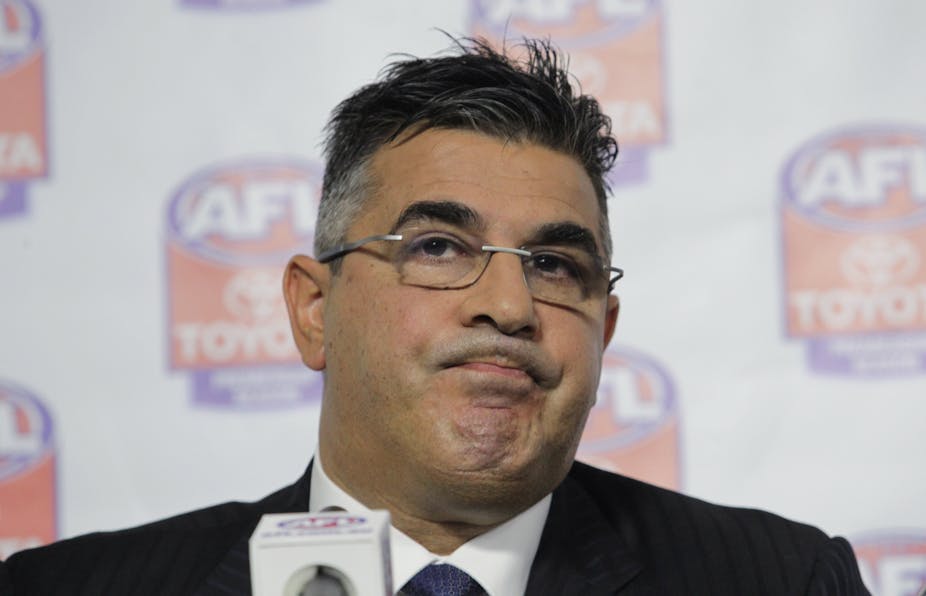Andrew Demetriou yesterday announced his retirement at the end of the 2014 season after 11 years at the helm of the AFL. The announcement was made at a set-piece press conference presided over by AFL Commission chairman Mike Fitzpatrick. It was made very clear that the timing is Demetriou’s and that the commission holds him in high esteem.
It is difficult to encapsulate Demetriou’s decade in a sound bite. He achieved a lot but has presided over some debacles. The sound bite would be that Demetriou has left the game with a fatter wallet but a diminished soul.
As a former player and former teacher, Demetriou brought a breadth and depth of social vision unmatched by his predecessors and unlikely to be found in his successors. He seized the potential for the league to advance important social causes such as fighting racism, violence against women and xenophobia. Progress on making a clear stand against homophobia has been slow, but recent developments show the AFL is getting serious about stamping it out.
But it is true that the AFL is a business and Demetriou is a businessman. During his reign, the AFL has gone from running a football competition to being a player in the media and entertainment industries. Television and multimedia rights – the most recent five-year broadcasting rights deal, negotiated in 2011, is worth A$1.25 billion – has left the AFL awash with money. But apart from player payments, where is it to go?
There is apparently not quite enough for the AFL to get into the business of building new stadia. But under Demetriou, the AFL has created two new teams, the Gold Coast Suns and Greater Western Sydney Giants. In keeping with the wallet and the soul, the new teams are in the “great untapped markets” of southern Queensland and western Sydney.
Places that love football but can’t afford a team, such as Tasmania and the Northern Territory, are still waiting. It is also striking that the national capital still does not host a team.
In Demetriou’s defence, no teams have died on his watch. All clubs are still in their chosen homes, albeit with some playing “home” games in pretty exotic places. Emphasising entertainment over grassroots, games are played from Darwin to Hobart to Wellington.
It is one thing to put on a show, another to grow roots. The AFL has chased the dollar and neglected the soul even as it has sought new converts.
In keeping with its pursuit of money, the AFL under Demetriou has embraced gambling in a big way. Gambling advertising and opportunities have become pervasive and have tarnished football’s family friendliness.
This development has also brought the requirement of “integrity”: that the game must be seen to be safe for gambling. While it is clearly preferable that the game gets a share of the money wagered on it, gambling must remain a parasite, not a predator.
The quest for integrity has targeted “tanking”: deliberately losing to gain more favourable draft picks. But in a move typical of the AFL approach to possible wrongdoing under Demetriou, the AFL imposed penalties on the Melbourne Football Club without ever actually finding that tanking had occurred.
The AFL introduced its illicit drug policy before it signed up to the World Anti-Doping Agency (WADA) code. The league clearly thought that being tough on illicit drugs was good for both player health and its image. That epitomises the Demetriou approach – good intentions, but always with an eye on the money and the league’s brand.

The AFL later signed on to the WADA rules, to be implemented by the Australian Sports Anti-Doping Authority (ASADA). It did so voluntarily. The AFL did not need the government money that was conditional on signing, but was again conscious of its image.
The ongoing ASADA investigation of the Essendon supplements program bears the hallmarks of the Demetriou era: a rigid application of the rules, but jumping to lay charges of bringing the game into disrepute before ASADA itself had laid any charges, with the AFL Commission acting as judge and jury.
Then, before any hearing and to forestall court action, the AFL negotiated a settlement in which the Essendon Football Club accepted carefully crafted punishments without an admission of guilt.
Senior coach James Hird was suspended for a year but with full pay. Assistant coach Mark Thompson received a fine, enabling him to step in as senior coach for the 2014 season. Essendon was declared to have missed the finals but was not disqualified from the whole 2013 season.
Leaks flowed freely throughout the whole process, giving the media a steady stream of material on which to speculate and conduct its own trials. Demetriou has wanted to keep the AFL on the front page as well as the back page all year round. With the Essendon saga, he certainly succeeded.
So, Demetriou leaves a mixed legacy. The game is in sound financial shape but still with difficult decisions to make about how the pie is to be divided. The game, with its soul diminished, is still loved by many, but increasingly ruled by commerce rather than passion.
Demetriou leaves big boots to fill. Questions remain as to whether his deputy and the favourite to replace him, Gillon McLachlan, is ready for the top job, despite Demetriou preparing him for the succession. Plenty of businessmen will be keen to take on the role, but Demetriou’s combination of ex-player credibility, business expertise and wider vision will be hard to match.

